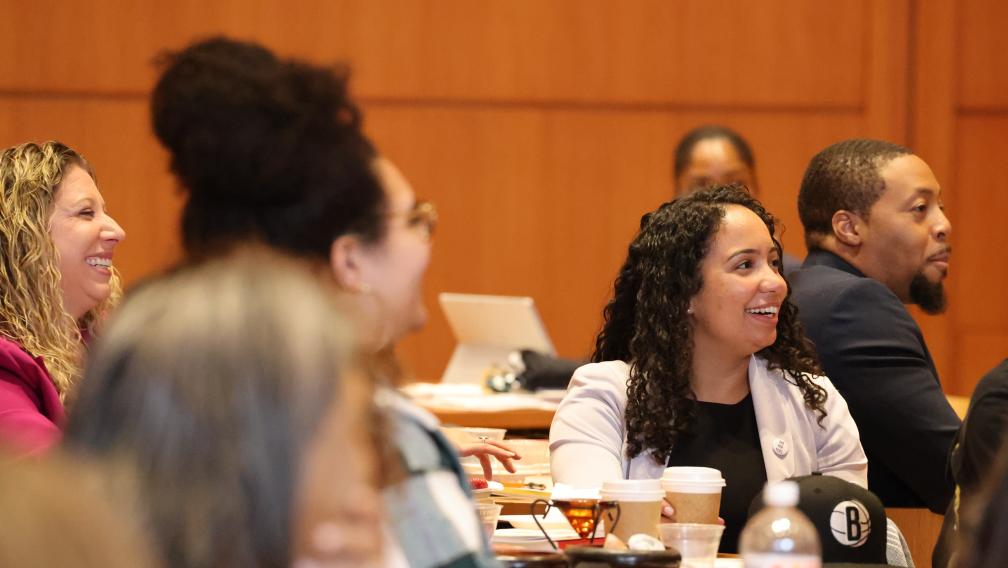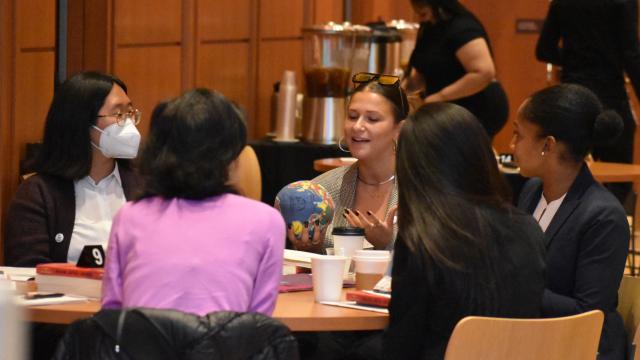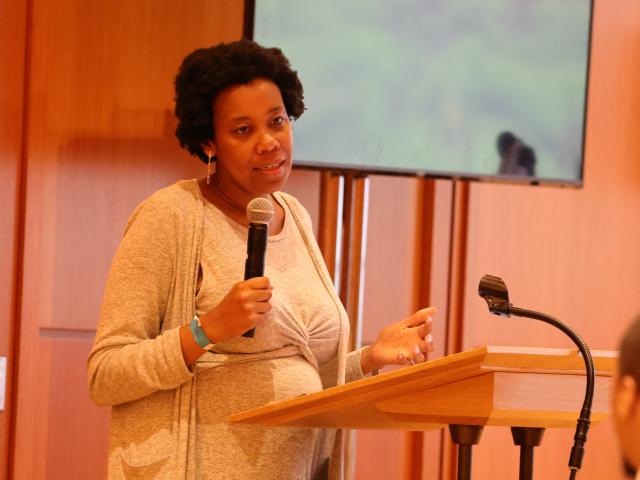On April 24, 2023, the Racial Justice team hosted a half-day convening to connect with Trinity grantees for an afternoon of healing, reflection, and community building.
Many grantee organizations kept their doors open to serve communities during the COVID-19 shutdown, launching new programs and campaigns, advancing groundbreaking policy changes, and protecting legislative wins. Grantees worked around the clock to ensure that the needs of communities were met during a time of catastrophic loss. An increase in the demand for programs and services has contributed to stress for staff members, leading to burnout.
While several interventions to support grantees have been underway, this event integrated restorative practices to help leaders thrive by deepening interconnectedness and grounding their experience in collective healing. Leaders can’t pour from an empty cup.
What is Restorative Justice?
The Restorative Justice Initiative (RJI) facilitated the restorative justice circles for the event. RJI, a Trinity grantee, is a citywide, multi-sector network of practitioners, advocates, and community members seeking to increase support for and access to restorative justice approaches for all New Yorkers. Restorative justice prioritizes wellness, community-building, and healing. It is a set of relational practices grounded in indigenous teachings and culture. By using restorative approaches, grounded in community agreements that were established by the participants, we created a space for authentic connection.
After participating in the circles, there was a brief share-out among grantees, who lifted up restorative justice as a pivotal strategy for healing. In order to provide services for participants and engage members in restorative practices, grantees elevated practicing joy as important to their work. Their key takeaway was the need to build and maintain spaces to return to each other to support healing from collective trauma.
Responding with our Strategy
As a church, Trinity operates under the belief that every person is created in the image and likeness of God and has dignity, value, and worth. Our collective future rests on our ability to support vulnerable and marginalized members of our communities. As such, our Racial Justice initiative aims to ensure a thriving New York City that supports all of its residents, especially those on the front lines of movement work.
With our grantees, Trinity continues to respond to the aftermath of COVID-19, and has honed our focus to support grantees for our city’s healing:
- With our Lead pillar, we are increasing our support of young people to foster their healthy minds and voices as engaged community members. We are supporting systems of community safety to demonstrate we can follow the wisdom of residents who are best positioned to identify what is needed for safety and justice.
- With our Prevent pillar, we are supporting efforts to end youth incarceration and ensure that all youth have access to the social, emotional, and restorative approaches in their communities. By ending cash bail, we are ensuring that New Yorkers, including young adults, do not languish at Rikers before having their day in court.
- With our Liberate pillar, we are working with our Housing and Homelessness initiative to expand housing options for justice-involved New Yorkers and end the continuous cycle for people with criminal records.
During the convening, we shared with grantees that this evolution of our work seeks to build the infrastructure to scale both restorative and transformative approaches that are rooted in communities, respond to violence, and deliver justice.
Integrating Healing Justice Practices
Reverend Jennifer Bailey of Faith Matters Network offered a brief keynote speech during the event. She offered some guidance based on the new anthology Healing Justice Legacies: Dreaming at the Crossroads of Liberation, Collective Care, and Safety by Cara Page and Erica Woodland, asking us to ponder these central questions: Where does it hurt? What needs healing?
The healing justice framework seeks the ways that events impact entire communities and envisions ways for us to hold one another collectively. The work of collective care is essential to stem burnout and is built on three principles:
- Collective trauma is transformed collectively. Healing justice is an emergent process to address our violence, crisis, trauma, and grief. It is necessarily collective because the traumas that many of our communities are carrying are historical and collective. Our struggles are a legacy of colonialism.
- There is no single model of care. Healing justice is a cultural strategy that seeks models of holistic care and safety that are rooted in creation, desire, transformation, and cultural design for building power and political strategy. Each of us needs a different kind of care, and each community we are working with requires a unique sort of care that works within its context.
- Healing strategies are rooted in place and ancestral technologies. Healing justice is a spiritual framework that seeks to remember lineages and models of integrative care that center on resiliency, survival, and joy. Truth-telling is instinctual, and society has violently separated us from our own history and ways of doing. Think about life's simple joys as a means of cultivating your own resilience.
Bailey closed her keynote address on a hopeful note by reminding us that joy is present even among sorrow, and it can bring us closer to a place of love, collectively and communally.
Calling Us Home
The Peace Poets, an artist collective of poets, hip-hop performers, and educators, opened and closed the event with songs and poems. Their performances took grantees on a journey and inspired hope for our collective future. Watch an excerpt of their performances in the following video.
Gatherings like this convening drive home how much community building is pivotal to "filling our cups"— it is grounding to bring together people doing similar work in such a unique experience. Through community, we are able to reimagine what long-term sustainable justice work can look like.


